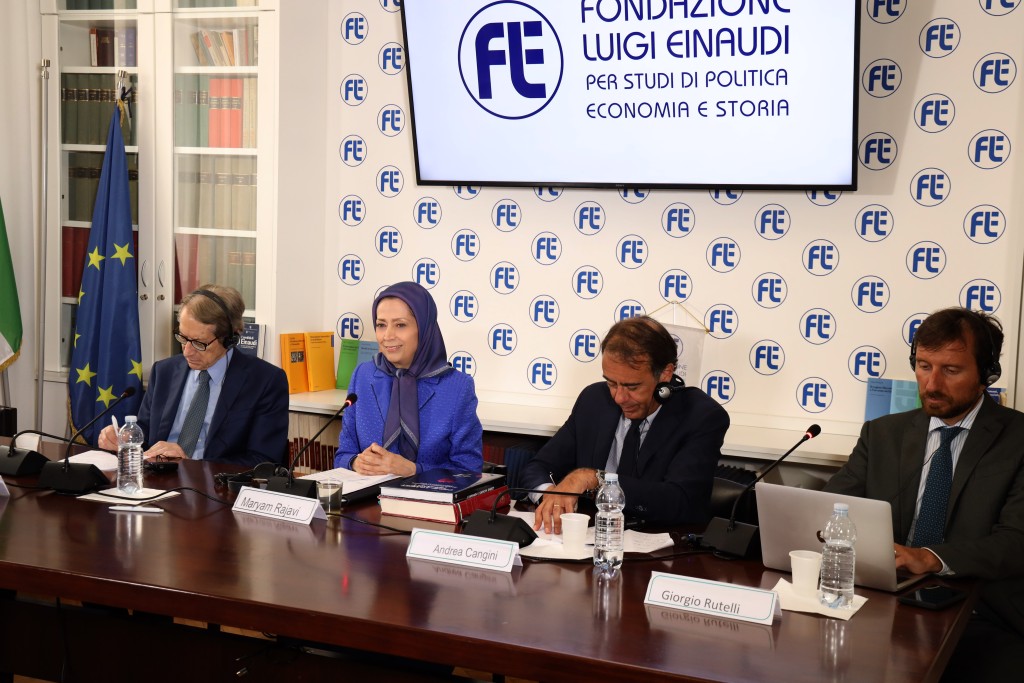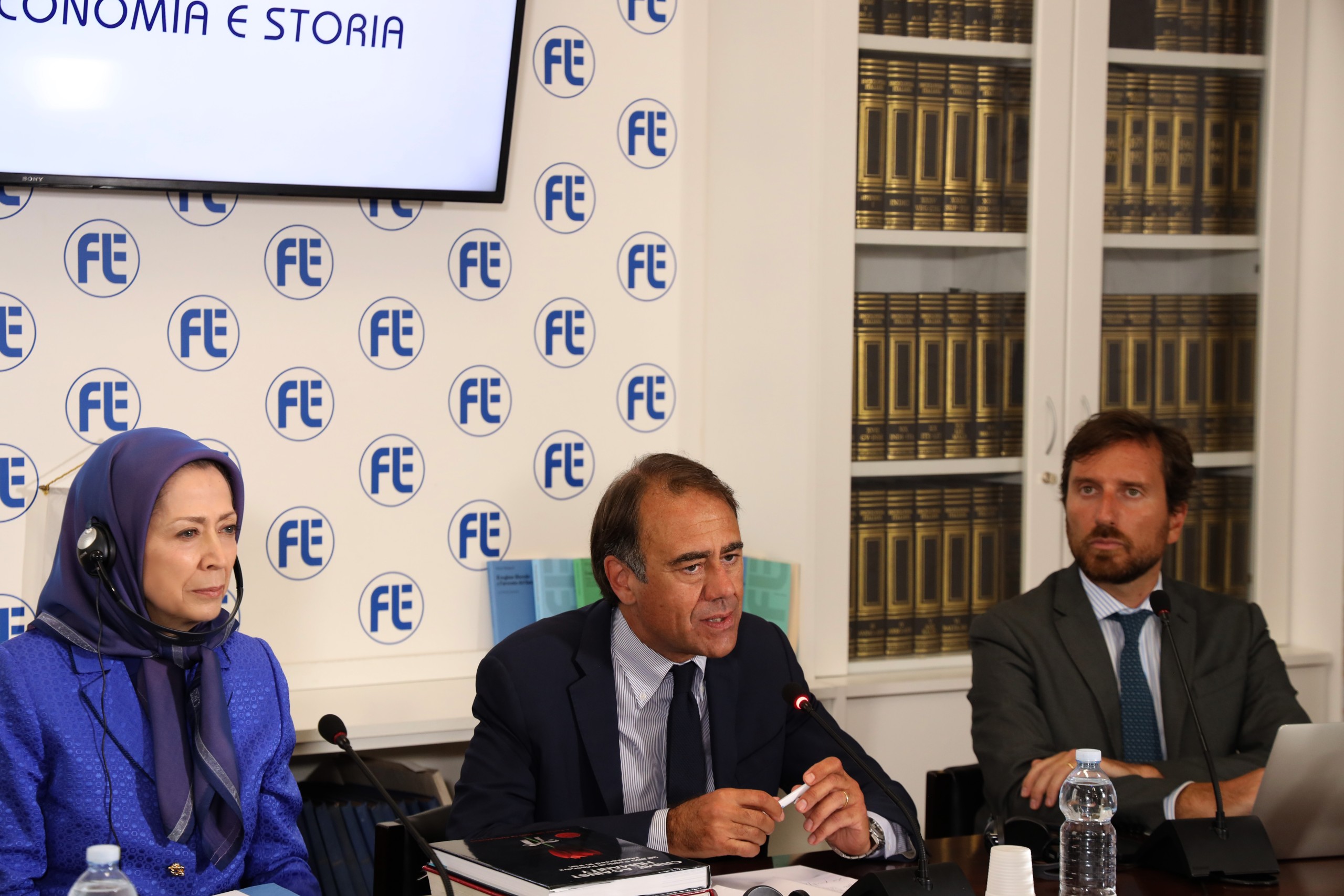Maryam Rajavi addresses Luigi Einaudi Foundation in Italy

Upon the invitation of the Luigi Einaudi Foundation, Maryam Rajavi attended a meeting at this research center. During her visit to this renowned research center, she discussed the economic and social crises plaguing the clerical regime, as well as the recent developments in the Iranian people’s uprising and Resistance. Furthermore, she shared her perspectives on the appropriate approach to confront the clerical regime in Iran and responded to a variety of questions.
Established 62 years ago, the Einaudi Foundation is named after Luigi Einaudi, the first President of Italy following the Second World War. It serves as a distinguished cultural, political, and economic research center in Italy.
The meeting commenced with the opening remarks from Senator Andrea Cangini, the Secretary General of the Luigi Einaudi Foundation, who warmly welcomed Maryam Rajavi. Senator Cangini emphasized the importance of continuously informing Western public opinion about the developments in Iran. He also highlighted the significance of maintaining public attention in the West to support the cause of a democratic Iran.
Furthermore, Senator Cangini called upon European and Western governments to unite in their approach. He emphasized that the foundation stood with the people of Iran and expressed his endorsement of Maryam Rajavi’s Ten-Point Plan. He noted that the plan advocated for fundamental principles such as public suffrage, gender equality, freedom of the press, pluralism, and parliamentarism, which are universally embraced by freedom-loving individuals in Italy and across the world. Senator Cangini regarded these principles as the foundation’s basis for action and a platform for progress.
Following Senator Cangini’s address, Senator Guilio Terzi, the Coordinator of International Affairs and the Scientific Committee of the Einaudi Foundation, delivered his remarks. He acknowledged the declaration by the majority of members from both the Senate and the Chamber of Deputies, affirming their belief in the National Council of Resistance of Iran and the People’s Mojahedin, who constitute a significant portion of the broad-based coalition led by Maryam Rajavi. Senator Terzi emphasized that this support is precise, recognized, and firmly established within the Italian Parliament.
In concluding his remarks, Senator Terzi advocated for a series of practical measures. These measures included combating terrorism, shutting down the Iranian regime’s centers that provide support to terrorist organizations, discontinuing commercial cooperation and international security collaborations with the Revolutionary Guard Corps (IRGC), and designating the IRGC as a terrorist organization.
During her address, Maryam Rajavi analyzed the volatile state of Iranian society and highlighted the extensive influence of the IRGC on various sectors of the Iranian economy. She pointed out that approximately half of the country’s gross national product is controlled by Ali Khamenei and the IRGC through their financial and commercial ventures. Additionally, she emphasized the economic burden imposed by the expenditures of the IRGC, Basij, and affiliated proxy militant groups in Lebanon, Palestine, Syria, Iraq, and Yemen, as well as the weight of Iran’s missile, nuclear, and drone programs on the country’s economy.
Subsequently, Mr. Giorgio Rutelli, the editor of Formiche magazine, assumed the role of moderator and posed several questions regarding the social and economic conditions in Iran and the programs of the Iranian Resistance.
The following is the text of Maryam Rajavi’s remarks during the meeting:
Maryam Rajavi: Iran’s economic situation reflects the final stages of the mullahs’ tyrannical religious rule
In recent months, Iran has become synonymous with the immense uprising of its people, yearning for the overthrow of the current regime. However, it has long been renowned for its abundant reserves of oil, gas, and its thriving consumer market.
This prevailing situation prompts a significant inquiry: Why does the ruling regime not employ its vast wealth to alleviate the mounting social discontent? This question unveils the economic landscape of Iran, wherein approximately half of the country’s gross national product revolves around the financial and commercial ventures controlled by Khamenei and the IRGC.
In terms of both quality and quantity, these entities wield unparalleled influence over the Iranian economy. They remain exempt from tax obligations, ensuring their revenues do not contribute to the nation’s economic cycle. Moreover, in addition to their companies’ profits, they absorb a substantial portion, approximately 25-30 percent, of the government’s annual budget.
The expenditures incurred by the IRGC, Basij, and affiliated proxy militant groups across Lebanon, Palestine, Syria, Iraq, and Yemen as well as the weight of the missile and nuclear and drone programs lay heavily on Iran’s economy.
Furthermore, this sector has been the primary beneficiary of withdrawals from the “National Development Fund” in recent years. A staggering $140 billion out of the $150 billion amassed in this fund has been squandered. Notably, companies associated with Khamenei and the IRGC receive substantial bank loans but fail to fulfill their repayment obligations.
As a consequence of these policies, Iran’s banking system is presently bankrupt. To mitigate the situation, the ten banks operating at a loss will be merged into larger entities. Consequently, Iran has witnessed virtually zero economic growth over the past decade.
Meanwhile, the Iranian population has grown by 11 million during the same period. Regrettably, the capacity to generate employment opportunities has been close to nonexistent or severely limited for the majority of years, leading to an alarming 59 percent of the population being categorized as inactive.
Last year, the investment rate in Iran plummeted to an alarming minus 60 percent. Despite possessing one of the world’s largest gas reserves, the country has been compelled to curtail gas supplies to its factories and power plants to meet the citizens’ needs during the winter season.
Insufficient investment has resulted in grossly unstable electricity provision in recent years. The entire nation is grappling with a widespread water crisis. Government interference has significantly harmed Iran’s water resources, exemplified by the diversion of water to IRGC factories.
The country faces an annual budget deficit of over 50 percent. In the past five years alone, the consumer price index has surged by a staggering 483 percent, while the inflation rate has soared to 70 percent.
Iran’s economic situation reflects the final stages of the mullahs’ oppressive religious rule.
Uprisings in Iran since December 2017
Concurrently, the regime’s social support has dwindled to a negligible extent. The uprisings that commenced in the final weeks of 2017 have escalated to unprecedented levels. These protests represent not the beginning but the culmination of societal confrontation with the ruling regime.
Since December 2017, Iran has witnessed a series of eleven nationwide uprisings. The so-called reformists were mere collaborators in the regime’s crimes. They had tirelessly attempted for years to present the regime as moderate. However, these uprisings have marked the end of their mission.
The demonstrators in Iran have made it clear that they refuse to return to the past or submit to the existing status quo. Instead, they aspire to forge a future under the principles of a democratic republic.
The uprisings continue towards the ultimate goal of toppling the regime. The Resistance Units remain tirelessly active, continuously striking blows against the prevailing repression.
The persistence of the uprisings are attributed to two key factors. First, the regime’s predatory policies and socio-economic mismanagement have exacerbated public discontent, leading to a growing dissatisfaction with each passing day. Second, there exists an organized Resistance movement that harnesses the widespread discontent, encouraging the public to rise up.

The phase of overthrow, key to understanding the Iranian problem
Why does the regime prioritize warmongering and terrorism, spending an exorbitant two trillion dollars on nuclear programs and their associated consequences in a nation with one of the world’s highest poverty rates?
The answer lies in the fact that the regime views its nuclear and missile programs, drone production, and the establishment of proxy militia groups in the Middle East as crucial tools to preserve the regime in the face of the looming threat of being overthrown. Understanding this key aspect is fundamental to comprehending the complexities of the Iranian problem.
The regime’s intense fear of its democratic alternative and its persistent demands on Western governments to impose restrictions on the Iranian Resistance stem from its impasse and desperate efforts to prevent its own overthrow.
This is also the reason why it does not bring down the level of repression and its terrorist activities outside Iran. These policies have resulted in widespread poverty, unemployment, water scarcity, homelessness, and a healthcare crisis, exacerbating the suffering of the Iranian people.
Any deals or agreements made with Iran ultimately benefit the companies owned by the IRGC and Khamenei, further damaging the Iranian economy. Year after year, the clerical regime has deliberately impoverished its citizens to maintain its grip on power, fueling growing public discontent.
As a result, the volatile conditions within Iran continue to intensify, fueling successive uprisings that aim to overthrow the regime. Therefore, the regime cannot return to the previous balance of power.
The solution to the Iranian problem and the path forward for Iran lies with the Iranian people and their Resistance movement and uprisings.
The democratic alternative, represented by the National Council of Resistance of Iran seeks to establish a democratic republic that upholds principles such as the separation of religion and state, gender equality, autonomy for various ethnicities, the abolition of the death penalty, and a non-nuclear Iran.
The Ten-Point Plan represents a comprehensive summary of the programs and plans adopted by the National Council of Resistance of Iran (NCRI) for the future of Iran. This plan enjoys worldwide consensus among lawmakers and representatives from Europe and the United States.
As outlined in the NCRI Plan, following the overthrow of the regime, free elections will be held within six months to establish a Constituent Assembly. The power will then be transferred to the elected representatives of the Iranian people, who will be entrusted with the task of drafting the Constitution.
A sound policy on Iran
During a meeting with the Italian Parliament’s Foreign Affairs Committee, I presented the elements of a sound policy on Iran, which can be formulated into six articles. Despite potential political and economic obstacles faced by Western countries, it is crucial to at least direct policies towards these elements, considering the immediate threats posed by the regime.
Regrettably, certain European and Western countries are moving in a direction that fuel the regime’s terrorism, warmongering, and insecurity in the Middle East and the world.
The six elements of a sound policy on Iran are as follows:
- Designating the IRGC as a terrorist organization and actively confronting its presence beyond Iran’s borders, including Syria, Iraq, Lebanon, Yemen, etc.
- Recognizing the Iranian people’s right to self-defense against the IRGC and their right to overthrow the regime and establish a democratic republic based on the separation of religion and state.
- Activating the trigger mechanism and implementing snapback sanctions by reinstating the six UN Security Council resolutions on Iran, including shutting down the nuclear and missile programs that violate UN resolutions and resuming unconditional inspections of nuclear and missile facilities.
- Referring the regime’s dossier of flagrant and systematic human rights violations to the UN Security Council and holding the regime’s leaders accountable for 40 years of genocide and crimes against humanity.
- Severing economic exchanges and imposing comprehensive sanctions on the regime, mainly through an oil embargo and a ban on banking relations, will effectively cut off the regime’s financial lifelines that enable domestic repression, nuclear weapons development, terrorism, and regional interference.
- Declaring the regime as a threat to global peace and security and placing it under Chapter VII of the United Nations Charter.

